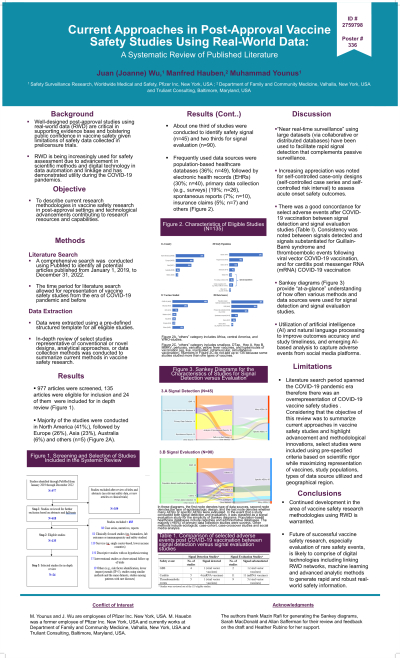Vaccines
Session: Poster Session B
(336) Current Approaches in Post-Approval Vaccine Safety Studies Using Real-World Data: A Systematic Review of Published Literature
Tuesday, August 27, 2024
8:00 AM - 6:00 PM CEST
Location: Convention Hall II


Joanne (Juan) Wu, ScD
Associate Director
Pfizer, United States- MH
Manfred Hauben
Former Pfizer Inc, United States
- MY
Muhammad Younus, MD, PHD
Pfizer Inc, United States
Presenting Author(s)
Co-Author(s)
Background: Well-designed post-approval studies using real-world data (RWD) are critical in supporting evidence base and bolstering public confidence in vaccine safety given limitations of safety data collected in prelicensure trials. RWD is being increasingly used for safety assessment due to advancement in scientific methods and digital technology in data automation and linkage, and has demonstrated utility during the COVID-19 pandemics.
Objectives: This systematic review presents current research methodologies in vaccine safety research in post-approval settings and highlights advancement in the field.
Methods: A comprehensive search was conducted on PubMed to identify relevant articles published from January 1, 2019 to December 31, 2022. Eligible studies were summarized by study design and pre-defined study characteristics. In-depth review of select studies representative of conventional or novel designs, analytical approaches, or data collection methods was conducted to summarize current methods in vaccine safety research, along with their strengths and limitations.
Results: Out of 977 articles screened for inclusion, 135 were eligible. These studies spanned diverse populations (eg, healthy adults, pregnant women, children, adolescents and elderly), and a variety of vaccines (eg, COVID-19, influenza, HPV, rotavirus, Tdap and shingles vaccines). About 70% of RWD were population-based healthcare databases (eg, European registries, electronic health records and claims). One third of studies were primarily conducted for signal detection and two thirds for signal evaluation. Advancements in vaccine safety methods include “near real-time surveillance” approach for rapid signal detection that complements passive surveillance, development of large collaborative data networks that enable robust safety assessment for rare events and special populations, increasing appreciation for self-controlled design (self-controlled case series and self-controlled risk interval) due to its resource efficiency and better confounding control, artificial intelligence (AI) and natural language processing to improve outcomes accuracy and study timeliness, and emerging AI-based social media analysis to capture adverse events as a novel tool for signal detection.
Conclusions: Continued development in vaccine safety research methodologies using RWD is warranted. The future of successful vaccine safety research, especially evaluation of rare safety events, is likely to comprise of digital technologies including linking RWD networks and machine learning, and advanced analytic methods to generate rapid and robust real-world safety information.
Objectives: This systematic review presents current research methodologies in vaccine safety research in post-approval settings and highlights advancement in the field.
Methods: A comprehensive search was conducted on PubMed to identify relevant articles published from January 1, 2019 to December 31, 2022. Eligible studies were summarized by study design and pre-defined study characteristics. In-depth review of select studies representative of conventional or novel designs, analytical approaches, or data collection methods was conducted to summarize current methods in vaccine safety research, along with their strengths and limitations.
Results: Out of 977 articles screened for inclusion, 135 were eligible. These studies spanned diverse populations (eg, healthy adults, pregnant women, children, adolescents and elderly), and a variety of vaccines (eg, COVID-19, influenza, HPV, rotavirus, Tdap and shingles vaccines). About 70% of RWD were population-based healthcare databases (eg, European registries, electronic health records and claims). One third of studies were primarily conducted for signal detection and two thirds for signal evaluation. Advancements in vaccine safety methods include “near real-time surveillance” approach for rapid signal detection that complements passive surveillance, development of large collaborative data networks that enable robust safety assessment for rare events and special populations, increasing appreciation for self-controlled design (self-controlled case series and self-controlled risk interval) due to its resource efficiency and better confounding control, artificial intelligence (AI) and natural language processing to improve outcomes accuracy and study timeliness, and emerging AI-based social media analysis to capture adverse events as a novel tool for signal detection.
Conclusions: Continued development in vaccine safety research methodologies using RWD is warranted. The future of successful vaccine safety research, especially evaluation of rare safety events, is likely to comprise of digital technologies including linking RWD networks and machine learning, and advanced analytic methods to generate rapid and robust real-world safety information.
